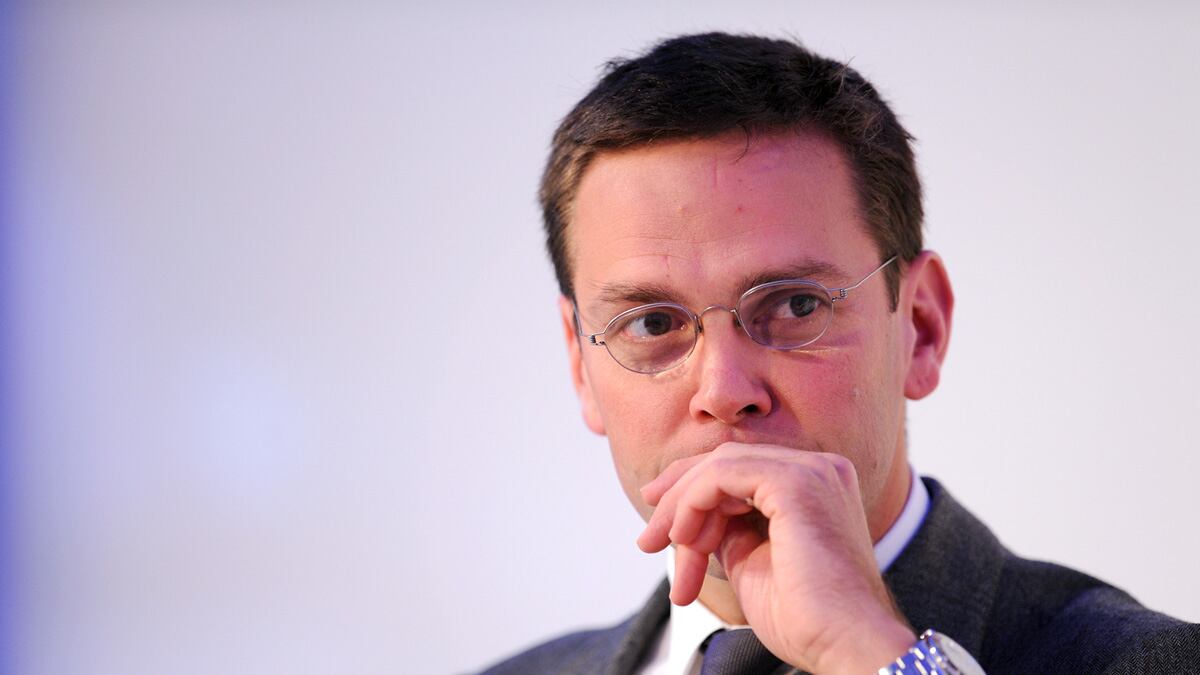It looks like a perfect act of defiance. On Thursday, the British broadcasting regulator, Ofcom, came to its long-awaited judgment on the “fit and proper” test for Britain’s dominant satellite broadcaster, BSkyB. Rupert Murdoch’s News Corp. owns 39.1 percent of the pay-TV company, and the media mogul's son, James Murdoch, was chair of both BSkyB and the British publishing subsidiary News International when there was a “cover-up” (in his father’s words) of the phone-hacking scandal.

James’s claim to be heir apparent to his father’s media empire rested to a large degree on Project Rubicon, a three-year strategy to take over 100 percent of BSkyB and combine it with News International to create a digital hub combining broadcast, print, and new media. The plan foundered in the wake of the revelations about the News of the World, which was shuttered last year after hundreds of new victims of phone hacking emerged from the files of a private investigator.
BSkyB may have kept its license, but its former chair and current non-executive director came in for some of the harshest language the regulator has ever delivered. While Ofcom gave BSkyB a clean bill of health, James Murdoch’s behavior was described as “both difficult to comprehend and ill-judged.” For five years, News International claimed the phone hacking had a handful of victims and was conducted by a rogue investigator and reporter. But since the revelation that a teenage murder victim’s phone was hacked, more than 50 people associated with News International have been arrested. Ofcom concluded that James’s oversight of the newspaper arm “repeatedly fell short of the exercise of responsibility to be expected of him as CEO and chairman.”
In effect, the report said that had James remained as chairman, the plug could been pulled on Britain’s most lucrative broadcaster. Moreover, there was a clear warning that, if further evidence should emerge that he had any involvement in the cover-up, even James’s current position as a non-executive member of the board would be in question. “Ofcom’s duty to be satisfied that a licensee is fit and proper is ongoing,” the report stressed. “Should further relevant evidence become available in the future, Ofcom would need to consider that evidence in order to fulfill its duty.”
Since he resigned from the chair of BSkyB earlier this year, James has also resigned several other prestigious U.K. directorships, including at the auction house Sotheby’s and the pharmaceutical giant AstraZeneca, and effectively relocated to the U.S. For the former heir apparent, and one of Britain’s most powerful movers and shakers, this is a massive comedown. But James remains a deputy chief operating officer at News Corp., and the response in New York was defiant.
Within hours of the damning Ofcom judgment, the Financial Times was running a well-sourced story that James was set to take over the running of the Fox Networks Group, one of News Corp.’s most lucrative divisions. Recently separated from 20th Century Fox Studios, the Fox Networks Group would be a key player in the new company that would emerge from his father’s plan to split the troubled publishing assets from the revenue-earning entertainment parts of News Corp.
The story was soon supported by The Wall Street Journal quoting “people familiar with the situation.” Since the WSJ has been owned by Rupert Murdoch for more than five years, one would assume it knows who is familiar and who is not.
The boardroom bravado, however, has already drawn criticism from some influential shareholders. Julie Tanner of the Christian Brothers Investment Services, a New York–based investor, called the mooted promotion for James a “slap in the face for shareholders, not to mention victims of the hacking scandal.”
Last year’s News Corp. AGM in Los Angeles saw a major independent shareholder rebellion against Rupert Murdoch’s sons, James and Lachlan, with majorities voting against them sitting on the News Corp. board. Because of differential voting rights between A and B shares, the Murdoch family controls News Corp., even with a minority of shares. But this year’s AGM looks to be stormier still, notwithstanding James’s proposed promotion. A key British parliamentary report held Rupert Murdoch himself “not fit” to hold the role of chair and chief executive of the world’s second-largest media conglomerate, and News Corp. is currently fighting a major shareholder suit in the Delaware courts.
For Lucy Marcus, a transatlantic expert on boards and corporate governance, the stubbornness of News Corp. is not a strength. “The worm is beginning to turn—people will be up in arms,” she told The Daily Beast. “In these days of transparency and fungible information, you can’t just command and control shareholders in the way you used to do.” Marcus is also highly critical of the News Corp. board, which shows little sign of independence from the Murdoch family. “The board is weighted with people beholden to Murdoch,” she said. “Rupert is brilliant in many ways, but it almost seems as if he thinks he’s invisible, he lacks a proper independent counselor to pull the wool from his eyes—something a truly independent board would bring.”
Beyond the boardroom politics and shareholder maneuvers, the fate of both James and his father may be ultimately beyond family control. This week the criminal trials for phone hacking begin in the U.K., with Murdoch’s former protégé Rebekah Brooks due to appear in court on multiple charges. Hundreds of new civil claims from alleged phone-hacking victims have been filed in the last week, with speculation that several of these might not be settled before trial, thus potentially leading to other embarrassing revelations. And in the background is the ongoing Department of Justice investigation into possible violations of the Foreign Corrupt Practices Act, that makes U.S. corporations and executives liable for corrupt payments to officials overseas.
Despite calls from Eliot Spitzer this Thursday for Eric Holder to immediately indict News Corp. for FCPA violations, such inquiries typically take two to three years. As Marcus says, the devil is often in the details in cases like this, “some decimal point in the wrong place.” As reported in The Daily Beast on Tuesday, the SEC is heavily involved (along with the FBI) in the investigation of News Corp.
Though James Murdoch may have used a setback in order to mount a comeback, there are many more dangers in the road ahead.





